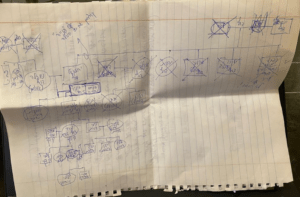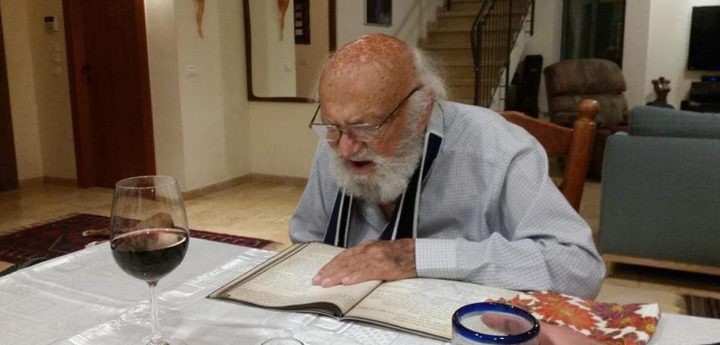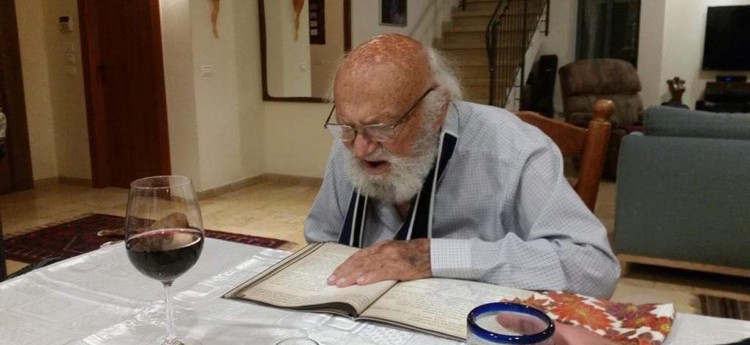In the contemporary mix of international politics, media reports of distant battles and casualties, or impassioned diatribe from armchair analysts, it is easy to forget that war, terrorism and injustice are written in the personal stories of real people.
To illustrate this truth, I offer an Israeli Jewish story related by a friend whom I have known since she was a child, Linda Davrath. Linda is American-born and was reared in a Christian family. For many decades, she has been an Israeli citizen, married to her Jewish husband, Sinai, with whom she has raised their three children — Yani, Yarden and Nadav. She is a secular Jew today, having undergone orthodox conversion in Israel during the 1980s, thus her children are also Jewish.

Robert Sellers
Linda grew up in the culturally complex island nation of Indonesia and is committed to the beauty of diversity. She is compassionate, kind, intellectually curious, well-read and devoted to her family. Professionally, she holds a Ph.D. in cardio-pulmonary physiology and manages the Israeli branch of a global clinical research organization. In her spare time, Linda practices and teaches yoga, and when it is safe, she mountain bikes around the Judean countryside with Sinai, as well as with Jewish and Arab friends.
While Sinai Davrath, a veterinarian and small animal clinic owner, believes there are many Israeli ancestral accounts more dramatic than his own, I am confident that his story is instructive and important. It is a profound reminder that Jewish families around the globe have been treated unjustly and that their travail must not be forgotten. More specifically, innocent Israeli families have endured many tragedies. Sinai’s story, as told by Linda, is so powerful that it is primarily communicated here using her words.
Linda begins the family saga with Ephriam, Sinai’s father:
Ephriam Davrath was born in 1926 in Cologne, Germany, to a religious family. They spoke German at home, and Ephriam learned Hebrew with private tutors. In 1935, his parents were concerned enough about the rising wave of anti-Semitism that they ‘made Aliya’ or moved ‘upward’ (a term used by Jews who dream of returning to their homeland). Before coming to Israel, they visited Ephriam’s grandfather and family in Poland. It was the last time they saw these members of the Dof (Hebraicized to Davrath) family as almost all of them were annihilated in the Holocaust.
“In the early 2000s when Ephriam revisited his childhood home, the Germans who had illegally appropriated the house would not even let him enter.”
In Israel, Ephriam’s family bought swampland from Arabs in Petach Tikva, (who thought they were foolish for wanting the useless land), where they built a tiny house to replace the three-story mansion they had vacated in Germany. Allowed only to ship furniture to Israel, but no cash or other valuables, they were willing to leave everything else in Germany in a gamble to save their lives. In the early 2000s when Ephriam revisited his childhood home, the Germans who had illegally appropriated the house would not even let him enter.
In 1944, at the age of 18, Ephriam volunteered for the Jewish brigade of the British army to fight Nazi Germany, undergoing training throughout Europe. After understanding that the volunteers weren’t actually needed in combat, however, the young man left the Jewish Brigade and served for a year in the refugee camps for Nazi survivors, helping them to escape to Israel. During that time, he gave his British military ID (which guaranteed a safe passage to Israel) to a Jewish person escaping from the Nazis.

Sinai and Linda Davrath
At that time, Ephriam’s aunt and uncle and their children tried unsuccessfully to get travel papers to Israel to escape the Nazi threat. Only their oldest child, 18-year-old Reuven, received a singular permit to immigrate to Israel with one suitcase of belongings. The rest of his family were refused travel permits by the Germans. His father, Ephriam’s uncle, was sent to a labor camp, then to Auschwitz where he was exterminated in the gas chambers. His mother wrote to Reuven in Israel about how afraid she was that his beautiful young sister Betti would be raped and mutilated by Nazis gangs who thrived in the permissive atmosphere where abuse of Jews was encouraged by the German authorities. Indeed, Betti and her mother were murdered in the labor camps. Hearing the news, Reuven was never the same and required extensive care throughout his life.
A year after giving away his travel permit, Ephriam was smuggled by ship to Israel. He arrived to a British declared state-of-emergency and was not allowed to return to his family in Petach Tikva, due to military curfews and restrictions of British rule. With the declaration of the State of Israel in 1948, he volunteered for the Hagana (“the defense”) and fought to break the siege on Jerusalem and free the Jewish population. After a short time, the Arab armies took over the Jewish quarter in the Old City of Jerusalem and he was taken prisoner by the Jordanian army. During the first few hours of captivity, he managed to smuggle a farewell letter to his family, asking them not to mourn him but to be proud of his contribution to liberating Israel. He was a POW for a year, and we know very little about this time. Only after the Red Cross delivered the letter several months into his captivity did Ephriam’s family know that he was even alive. Subsequently, Ephriam was freed in a prisoner exchange between Israel and Jordan.
Following his studies, Ephriam went on to serve as senior economist at the Bank of Israel for 10 years, and as economic advisor to 10 consecutive ministers of finance in the Israeli government. He also served several years as Israeli council in Chicago, where my husband, Sinai, was born. Ephriam then was assigned a similar responsibility in Bohn, Germany, and later was the finance liaison with Germany regarding monetary compensation to Israeli Holocaust victims. Although he refused to accept the recognition, Sinai’s father was awarded the highest German medal of honor given to a non-German for this work.

Family tree of Ephriam Davrath’s parents. Six out of seven siblings of Ephriam’s father were exterminated in the Holocaust. Only Ephriam’s parents had the foresight to escape Nazi Germany and came to Israel, where they were spared.
Ephriam passed away three years ago. His and other Holocaust survivors’ personal histories are the fabric of Israeli society. The amputated family lines, tiny remnants of survivors, and a past so incomprehensibly cruel are tragedies that cannot be comprehended. The grotesque evil and destruction by the Nazis, their European collaborators, and the Americans who failed to destroy the German killing machine of death camps and gas chambers, left a deep, desolate sense of abandonment. The world betrayed the Jews and looked the other way while the Nazis systematically and efficiently murdered 6 million Jews.
At this juncture in Sinai’s account, the story added analysis to family narrative, which is very insightful. Linda continues:
Prior to the Holocaust, Jews lived in many Arab countries; but with the rise of Nazism, Arab countries also began persecuting their Jewish populations. Thousands of Jews (except a handful across the vast Arab world) fled for their lives from countries such as Iran, Iraq, Morocco, Tunisia and Yemen — where their homes and property were taken from them and they barely escaped with their lives.
After the fall of the Nazi empire, the U.N. affirmed the right of surviving Jews to settle in Israel. The British declared the state of Israel in 1948, dividing the land, which had been occupied for centuries by Jews and nomadic Arabs, between the Arabs and Jews. Arabs who were willing to accept Israeli citizenship became “Arab Israelis.” They are Muslim Arabs but have full citizenship in Israel and largely live peacefully with their Jewish neighbors. Yet, on the day of the declaration of the state of Israel by the U.N., seven neighboring Arab countries attacked Israel from all its borders simultaneously.

The Davraths mountain biking in the Judean Hills.
After Ephriam concluded his mission in Chicago, the family returned to Israel when Sinai was 2 years old. When Sinai finished high school, he joined the army for three years of mandatory service, as all youth are obligated to do. Sinai was recruited into an elite unit of the paratroopers and, like his father, had to face active combat to defend Israel’s borders during the Lebanese war. The reality of a combat soldier in Israel is harsh, lacking any of the comfort and security Americans take for granted, but he served out of a sense of duty in order to protect the one place where Jews should feel safe, knowing that no one else can be counted on for this protection.
Then Sinai’s account turns even darker, as Linda relates:
The Islamic Resistance Movement, Hamas, rules the Gaza strip. A translation of the charter is instructive. Of particular interest is Article 13 where the manifesto states: “Peaceful solutions are contrary to the belief of the Islamic Resistance Movement … . There is no solution to the Palestinian problem except by Jihad.” How should Israel negotiate with Hamas when their charter calls for the destruction of Israel and delegitimizes negotiations? In the Arabic press, Hamas repeatedly vows to run the Jews into the sea as their ultimate goal. Funding much of Hamas’s terrorist activities is Ahmadinejad, the president of Iran, who declares that Israel must be wiped off the map. He promotes Holocaust denial and supplies hundreds of thousands of missiles to Hezbollah in Lebanon, Syria and Iraq, creating a “ring of fire” around Israel.
These terrorist regimes don’t want peace with Israel, they want to destroy Israel. In fact, the Arab world holds the Palestinians hostage and have no interest in resolving the conflict. Jews have been living in Israel since the beginning of time. At minimum, we have as much right to be here as the Palestinians, yet Hamas rejects the idea of any kind of negotiated solution. It manipulates the media to present the Palestinians as poor, weak and destitute, oppressed by Israel, while holding their own civilians as hostages. Billions of dollars have poured into Gaza over the years, yet there is no accountability for how that money is spent. It is well-documented that if a Palestinian in Gaza refuses to enable Hamas to set up rocket launchers in their yard, they are murdered. Hamas shoots from hospitals, schools and orphanages, knowing that Israel must respond to take out the rocket launchers. Hundreds of kilometers of tunnels have been built, solely to infiltrate Israel and conduct terrorist attacks, yet rather than protecting civilian Palestinians there when Hamas has provoked Israeli missile fire, they leave civilians to fend for themselves on the street while the Hamas terrorists are safe tens of meters underground.
“We have as much right to be here as the Palestinians, yet Hamas rejects the idea of any kind of negotiated solution.”
In the recent Gaza war, over 2,400 missiles were fired at Israel’s cities and civilian centers. Being the only country in the world to live in such a twisted situation, Israel developed the Iron Dome missile interception system, which was successful in stopping over 90% of the missiles fired at us. Despite this strategic defense, for 12 days of missile barrages Israelis grabbed their children and ran to bomb shelters dozens of times a day. For those who live near Gaza, the warning time is 15 seconds. The situation is terrifying and the danger very real. How must Israel respond to missiles fired at our schools, homes, hospitals and shopping malls?
The West loves a David vs. Goliath story, yet rather than recognizing the massive Islamic firepower aimed at Israel and the free world, they chastise, berate and ostracize Israel for defending itself. The Israeli/Palestinian conflict is terribly complex, yet if it were up to the Israelis and Palestinians, we would have found a way to compromise long ago.
Tragically, for both parties involved, the conflict has been appropriated by terrorist regimes and fundamentalist Islamic states whose raison d’etre is the destruction of Israel. Keeping the Israeli/Palestinian conflict as a festering wound serves to unify the fundamentalist Arab world. The West, especially America, gives billions of dollars to Gaza, but where are the schools, hospitals, universities or sports fields? Where has this money been used to better the lives of Gazans? Tragically, the money has been used to buy more sophisticated weapons and to build a tremendous infrastructure for attacking Israel, while little has been spent to improve the lives of peaceful Palestinians.
Linda concludes Sinai’s story with a sobering reflection:
Our family has responded as Sinai did, and as his father, Ephriam, had done. Our children went into the army at the age of 18 or 19. They forgo their dreams of competing internationally in mountain biking competitions. They delay their desire to travel the world and explore Indonesia’s amazing jungles — the land where I grew up. They postpone their academic degrees and go to do what their father and their grandfather did. They protect Israel from those who want to kill us.
Military action brings the ultimate risk to our children, both emotionally and physically. Golda Meir captured our cruel reality best, saying, “When peace comes we will perhaps in time be able to forgive the Arabs for killing our sons, but it will be harder for us to forgive them for having forced us to kill their sons.”
Remarkably, as we speak, the first-ever Arab (Mahmud Abas) is being sworn in as a member of Israel’s Parliament, together with second-generation Holocaust survivors. Perhaps we are entering an era of hope. Our family and millions of other Israelis certainly long for that peace.
Rob Sellers is professor of theology and missions emeritus at Hardin-Simmons University’s Logsdon Seminary in Abilene, Texas. He is a past chair of the board of the Parliament of the World’s Religions in Chicago. He and his wife, Janie, served a quarter century as missionary teachers in Indonesia. They have two children and five grandchildren and now live in Waco, Texas.
Related articles:
Apartheid in Palestine and a Christ who stands on the other side of the wall | Analysis by Chris Conley
Trump’s Middle East peace plan makes sense until you read it, Christian peace activist says


